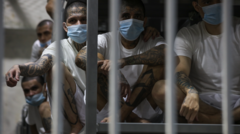President Nayib Bukele of El Salvador has boldly proposed a prisoner swap involving 252 Venezuelans deported by the United States, in exchange for the release of an equal number of political prisoners currently held in Venezuela. The proposal, made through Bukele's social media, directly addresses Venezuelan President Nicolás Maduro, who has faced international criticism over human rights issues and political repression.
In his post, Bukele highlighted that many of the deportees are accused of serious crimes, including "rape and murder," likening their situations to that of Venezuelan prisoners jailed for opposing Maduro’s regime. The proposal suggests a humanitarian angle, aiming to alleviate the plight of those imprisoned. Bukele emphasized that the swap could extend to nearly 50 other prisoners of different nationalities, including American citizens.
The Venezuelan government swiftly responded through chief prosecutor Tarek William Saab, who challenged Bukele on several fronts. Saab demanded clarity on the crimes faced by the deportees, alongside whether they had received proper legal representation or gone before a judge. Venezuela firmly denies the existence of political prisoners—a stance that rights organizations dispute vehemently.
Recent actions highlight the complex relationship between the US and El Salvador, with over 200 Venezuelans transported from the US to El Salvador in recent weeks. The deported individuals have been labeled as members of the Tren de Aragua gang, prompting the US to pay El Salvador for their detention in high-security facilities notorious for strict policies.
Amid these developments, President Bukele has garnered popularity for his rigorous anti-gang measures, dubbing himself "the world's coolest dictator." Contrastingly, Maduro condemned the US strategy of deporting Venezuelans to El Salvador as "kidnapping" and a significant human rights violation. This situation occurs within the broader context of the US's stringent immigration policies initiated during the Trump administration, which are currently facing legal scrutiny.
The US Supreme Court has recently ordered a pause on the deportation of Venezuelan gang member allegations, with the White House calling the legal challenges against mass deportation efforts "meritless litigation." The Trump administration has invoked the Alien Enemies Act, a historical law enabling the president to detain and deport individuals from “enemy” nations without standard legal processes.
















